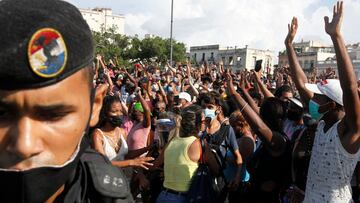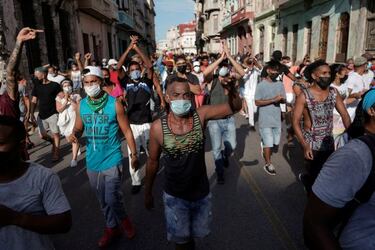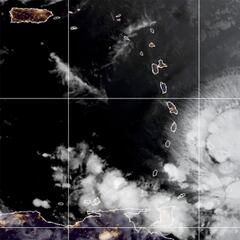Cuba protest: why are people protesting?
Protests erupted across Cuba over the coronavirus situation and an economic downturn on the island, prompting a response from Miguel Díaz-Canel.

The Cuban government has been rocked by widespread protests sweeping the country on an almost unprecedented scale. Thousands of people marched in the streets of Havana, Santiago and other Cuban cities on Sunday in condemnation of the Communist Party of Cuba (PCC)’s handling of the coronavirus pandemic, an economic downturn that saw the national economy shrink by 11 percent in 2020 – it’s sharpest decline in decades – shortages of food and medicine and daily blackouts due to limitations on generating capacity.
In the first major crisis of Cuban President Miguel Díaz-Canel’s tenure, protestors thronged areas of Havana, including the capital’s popular tourist thoroughfare the Malecón, clashing with pro-government counter-protestors and military personnel. Díaz-Canel assumed power in Cuba first as successor to Raúl Castro as president in 2019, and then as First Secretary of the Central Committee, Cuba’s most prominent position earlier this year, in doing so becoming the first non-Castro to preside over the PCC since the Cuban Revolution.
Díaz-Canel calls on "revolutionaries and Communists" to respond

Evoking the exploits of his predecessor Raúl, his brother Fidel and Che Guevara, Díaz-Canel made a televised address to the nation calling on all “revolutionaries and Communists” to take to the streets “wherever there is an effort to produce these provocations,” drawing sharp criticism from the US Department of State's Bureau of Western Hemisphere Affairs Acting Assistant Secretary Julie Chung, who called for “calm and the right to peaceful assembly.”
However, many pro-government Cubans heeded Díaz-Canel’s call to counter the protestors and took to the streets chanting pro-Fidel Castro slogans. Special forces jeeps, with machine guns mounted on the back, were seen in Havana after Diaz-Canel called on supporters to confront “provocations” while blaming the US for the protests.
Thousands of people gathered in downtown Havana amid a heavy police presence. There were reports of a few arrests and scuffles, but no major confrontations.
The protests broke out in San Antonio de los Banos municipality in Artemisa Province, bordering Havana, with video on social media showing hundreds of residents chanting anti-government slogans and demanding everything from coronavirus vaccines to an end of daily blackouts.
Cubans angry over covid vaccine rollout delays
🇨🇺 “#PatriaYVida” or "Homeland and Life"
— Bloomberg Quicktake (@Quicktake) July 12, 2021
Anti-government protests broke out across #Cuba against food shortages and high prices. The country is facing its worst economic crisis in decades as #Covid19 cases rise https://t.co/BF8acMVZz8 pic.twitter.com/LQtmeaMzUj
Cuba, which has a world-renowned public health service, has developed its own covid-19 vaccines – Abdala and Soberana 02 - and had been largely unscathed by the pandemic during 2020. However, reopening to tourism, one of the island’s primary sources of foreign currency, and holdups in the vaccine rollout have seen cases spike with around 7,000 new infections reported on Sunday.
In addition to frustration over the pandemic and government restrictions to try and prevent the spread of covid, food shortages have worsened, medicine is scarce and the daily blackouts continue.
“They are protesting the crisis, that there is no food or medicine, that you have to buy everything at the foreign currency stores, and on and on the list goes,” Claudia Perez, a resident of Santiago de Cuba, told Reuters.
Biden yet to reverse Trump sanctions on Cuba
Though the Biden admin has announced a review of Trump's aggressive policy on #Cuba, it has thus far failed to reverse any of them, effectively leaving the current pressure in place.https://t.co/Sm8e8xnx3d
— WOLA (@WOLA_org) July 10, 2021
Related stories
US policy towards Cuba was toughened in the final days of the Trump administration, with the former president imposing a glut of fresh sanctions on the island as he tightened the decades-long embargo. Trump also added Cuba to the US list of state sponsors of terrorism, a move which has yet to be undone by the administration of President Joe Biden, which has also stated the island is not a policy priority and has so far not made any moves to revoke the sanctions imposed last January.
This, and the pandemic, have provided Díaz-Canel with a target to deflect attention from a two-year economic crisis on the island but the PCC is now facing the prospect of facing down growing unrest from its own populace as social and economic conditions worsen.

